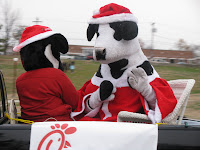Mondays are busy at the restaurant anyway, but today had its own pace. Because of the holiday and the fact that the Duke students were gone, we had been closed since Tuesday night; everything had to be made new today. Still, when I left the house this morning, I put my two Advent books in my bag. I was determined to find even a few minutes to read. A little after three o’clock I made my way across the Plaza to Joe Van Gogh: The Art of Coffee for my afternoon coffee and I took Oates with me. The chapter was short: “First Loves: From “Jabberwocky” to “After Apple Picking.” She began:
There are two primary influences in a writer’s life: those influences that come so early in childhood, they seem to soak into the very marrow of our bones and to condition our interpretation of the universe thereafter; and those that come a little later, when we are old enough to exercise some control of our environment and our response to it, and have begun to be aware not only of the emotional power but the strategies of art.
I was in second grade when I memorized my first poem: “Missing” by A. A. Milne. I can still recite it.
Has anybody seen my mouse?
I opened his box for half a minute,
Just to make sure he was really in it,
And while I was looking, he jumped outside!
I tried to catch him, I tried, I tried….
I think he’s somewhere about the house.
Has anyone seen my mouse?
Uncle John, have you seen my mouse?
Just a small sort of mouse, a dear little brown one,
He came from the country, he wasn’t a town one,
So he’ll feel all lonely in a London street;
Why, what could he possibly find to eat?
He must be somewhere. I’ll ask Aunt Rose:
Have you seen a mouse with a woffelly nose?
He’s just got out…
Hasn’t anybody seen my mouse?
I learned the poem because my mother told me my father had memorized it when he was in second grade and I wanted to surprise him for his birthday. Perhaps Oates is right about those early influences soaking into our marrow; my father and Winnie the Pooh are still with me.
The first time I remember a painter capturing my attention was my sophomore year in high school, when Don McLean sang “Vincent.” That’s right. I found art through AM pop radio. My freshman year in college, “Stopping by Woods on a Snowy Evening” stopped me in my tracks. I was a teenager, struggling to come to terms with myself (whom I didn’t like much), my rootless life as an MK, and my faith. To hear that one could feel no hope left inside on a starry, starry night, or that the serenity of a snowy night might lead to reminders of promises to keep and miles to go taught me that faith, like art, has its strategies.
Strategy. It seems an odd word to connect with art and faith. for me because I hear it first as a military word and then a business word, neither of which do much for me as metaphors for either faith or art. (Spend some time here and you’ll see what I mean.) And – not but; and – if we choose to make meaning of our world, our lives we begin to format a perspective, a response, a way of being. Art and faith, at their best, call us to a strategy of openness, of vulnerability, of compassion, which means we are not necessarily in it to win it as much as we are in it, period, and not alone.
Oates has her own Frost connection. She points to “After Apple Picking,” finding resonance in the lines:
For I have had too much
Of apple picking; I am overtired
Of the great harvest I myself desired.
“The poem’s powerful subtext,” she says, “is the inevitability of loss. . . In its understated way the poem is a tragic work of art. Yet there remains a defiant human resilience beneath, as in us all.” The short story of the day, which I read when I got home from work, was Richard Bausch’s “Design,” which was his own expression of the inevitability Oates recognized, as he tells of two ministers coming to terms with their own mortality.
I’m three days away from my one year anniversary at the restaurant, eleven days from my fifty-second birthday, and another fortnight beyond that from getting to the Manger. Each of those markers is filled with hope, loss and resilience.
Ginger came to eat at the restaurant tonight with our friends Jay and Eloise, who have been with us for Thanksgiving, as they are most every year. About an hour after they left, my phone rang and Ginger said, “Have you seen the sky?” with an air of expectancy in he r voice. She went on to describe what it looked like to look up and see the moon, Jupiter, and Venus aligned more closely than they will be for another forty years.
r voice. She went on to describe what it looked like to look up and see the moon, Jupiter, and Venus aligned more closely than they will be for another forty years.
“It’s a Bethlehem Star kind of night,” she said.
My windowless kitchen doesn’t afford me a celestial view, so the three heavenly bodies passed by each other while I cooked. I walked out under the night sky a few minutes ago to see what I could see and there was Orion, my favorite constellation, hunting without the benefit of the bright lights, keeping his promises. As I tried to imagine what the spectacle might have looked like, I thought of Yeats talking about his “mind’s eye” as he described the Magi:
Now as at all times I can see in the mind’s eye,
In their stiff, painted clothes, the pale unsatisfied ones
Appear and disappear in the blue depth of the sky
With all their ancient faces like rain-beaten stones,
And all their helms of silver hovering side by side,
And all their eyes still fixed, hoping to find once more,
Being by Calvary’s turbulence unsatisfied,
The uncontrollable mystery on the bestial floor.
From magi to shepherds, from starry nights to simmering sauces, from celestial spectacles to familiar formations, everything is being pulled to the magnet of the Manger, to the uncontrollable mystery of a God whose name – whose very being – is Love.
Perhaps I’ll listen now.
Peace,
Milton
(I love the synchronicity of the image being created with the help of www.starrynight.com.)







